By Brian Ross, James Gordon Meek & Lee Ferran
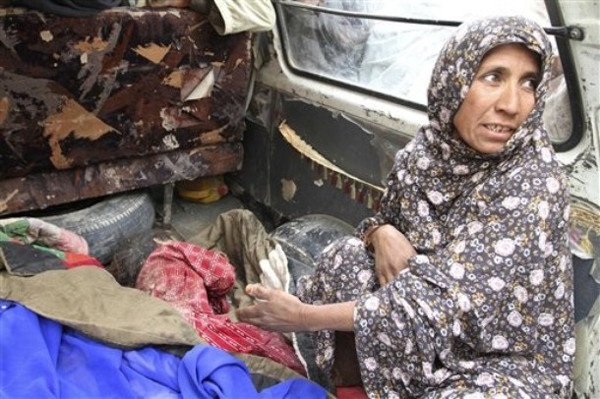
Anar Gul gestures to the body of her grandchild, who was allegedly killed by a U.S. service member in Panjwai, Kandahar province south of Kabul, Afghanistan, Sunday, March. 11, 2012. (Photo: AP)
The American soldier who murdered 16 Afghan civilians was based at an Army post with Special Forces teams immersed in a culture of drugs, booze and casual racism – one not overseen by Special Forces leadership because they chose to take a “hands-off” approach, according to newly released military report.
The damning assessment by U.S. military officials came in the aftermath of the 2012 massacre by Sgt. Robert Bales, now serving a life sentence after being convicted in a court-martial of multiple counts of murder. The report was made public today only after a group of journalists challenged a decision by the Pentagon to keep it secret.
“[T]he command climate at VSP [Village Stability Platform] Belambai suffered from low standards of personal conduct and discipline while at the VSP,” says the executive summary of a 500-plus-page Department of Defense report posted online today. “Foremost responsible for the failures in personal conduct at VSP Belambai are the NCOs [non-commissioned officers] that committed, participated in, or tolerated the inappropriate behavior or failed to report the behavior to a responsible authority.”
The 2012 report says some members of the Special Forces teams, and the regular infantrymen attached to them, “tolerated and/or participated in the use of alcohol… use of steroids, and inappropriate remarks and behavior with respect to Afghans.”
“Several NCOs at VSP Belambai uttered offensive racial/ethnic slurs, but the practice was not widespread, and usually comments were made among peers and in a joking manner,” the report says.
If one of the junior soldiers wanted to report any wrongdoing, the report says they would’ve had trouble considering “most often, their higher infantry leadership was committing the misconduct,” and the Special Forces leadership “took a ‘hands-off’ approach and did not overtly provide guidance on standards or expectations.”
The report was compiled by Brigadier General Ricky Waddell on behalf of U.S. Forces in Afghanistan commander Gen. John Allen in 2012.
The report says that Bales’ superiors should’ve known he was potentially dangerous, but it takes pains to say that nothing the sergeant had done prior to the shooting -- including disturbing incidents of alleged steroid abuse, Bales describing an Afghan soldier as “not a person” and a violent episode involving an Afghan truck driver just a week prior to the incident -- should have alerted anyone that he was going to commit mass murder.
“At a minimum, the [Special Forces] leadership should have known about the incident in which SSG Bales assaulted the truck driver and should have known about the concern of SSG Bales acting erratically due to his use of steroids,” the report says. “Both of these instances of conduct amount to warnings and indicators that SSG Bales would engage in future unwarranted violent behavior against Afghans. These instances, however, do not rise to the level of warnings or indicators that SSG Bales would commit the extremely violent acts he allegedly committed on 11 March 2012.”
ABC News previously reported on the rampant drug and alcohol use by Special Forces members downrange.
“Pills and booze – every A-camp,” one combat-decorated, 10-deployment Special Forces soldier told ABC News last year, referring to bases run by Operational Detachment-Alpha (ODA) teams.
“They can get out of hand for sure,” agreed another Special Forces soldier with a dozen combat deployments. “Most SF [Special Forces] dudes can still work but there are always a few who lose control and can’t even function… It is what it is. Warriors dealing with s*** the public doesn’t want to hear about or try to understand.”
In conversations with ABC News last year, special operations sources did not describe a secret culture of commando junkies but of operators who safely "self-medicate" to keep fighting at peak performance.
More recently, Brett Jones, a gay CIA contractor and former Navy SEAL, described to ABC News the widespread racism and homophobia he has experienced in his decade-plus career surrounded by current and former special operations personnel. Jones spoke out to ABC News after a particularly disturbing incident in Afghanistan in which he said former special operations members contracted to the CIA made displayed repeated racist and homophobic behavior – so much so that he eventually feared for his life.
Bales was not himself a member of Special Forces, but was a regular infantryman attached to a Special Forces team to help provide security during operations. Bales pleaded guilty to the murder 16 Afghans and was sentenced in August 2013 to life without parole.
At his court-martial, Bales said he conducted the March 2012 late-night attack in which he slaughtered men, women and children "behind a mask of fear... and bravado."
"I'm truly, truly sorry to those people whose families got taken away," he said.
After a battle over the report, U.S. Central Command published it online today in response to a Freedom of Information Act request by several news outlets, including ABC News’ Tampa Bay affiliate WFTS.
Originally published on Aug 18, 2015
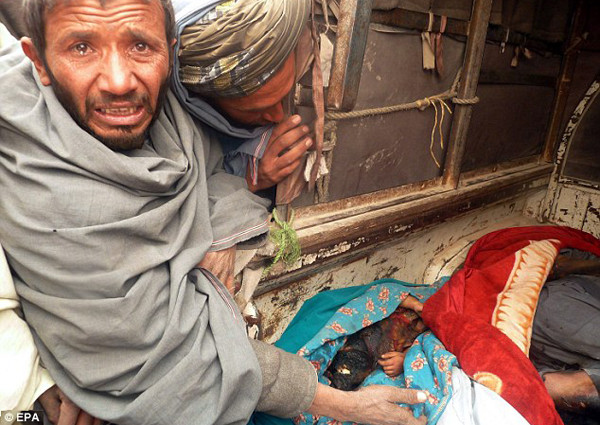
Disbelief: Two grief-stricken Afghan men look into the van where the body of a badly burned child lays, wrapped in a blue blanket. (Photo: EPA)
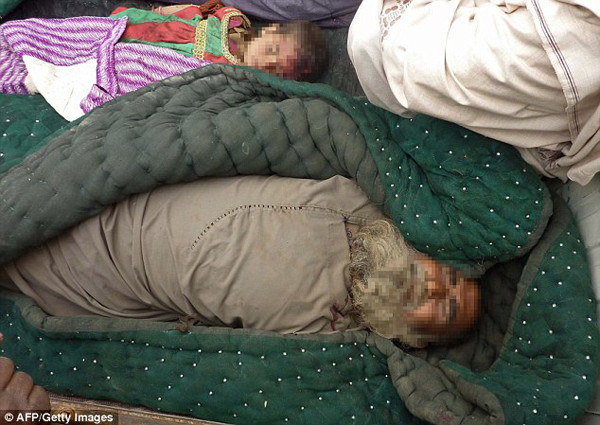
Horrific: The bodies of an elderly Afghan man and a child killed in the Alkozai village of Panjwayi district are shown wrapped in blankets. (Photo: AFP/Getty Images)
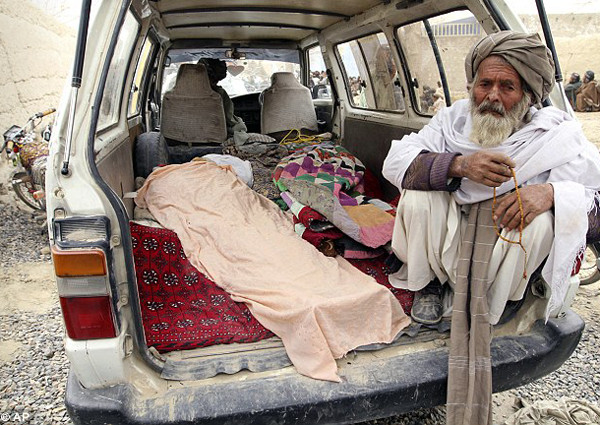
Perched: An elderly Afghan man sits next to the covered body of a person who was killed early today by a U.S. service member. (Photo: AP)
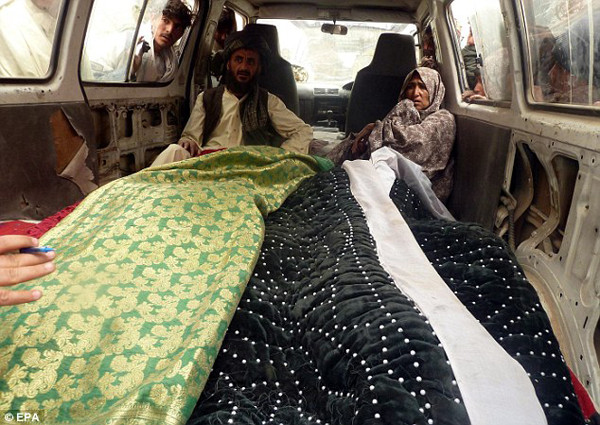
In shock: Relatives sat in shock in a van also carrying the bodies of their kin wrapped in blankets. (Photo: EPA)



